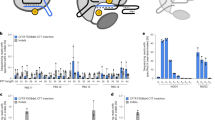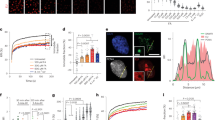Abstract
We describe a fast and unambiguous method for haplotyping the (TG)mTn repeat in IVS8 and determining three other single nucleotide polymorphisms (SNPs) in exons 10, 14a and 24 in the cystic fibrosis transmembrane conductance regulator (CFTR) gene affecting correct splicing of the CFTR pre-mRNA using primer extension and mass spectrometry. The diagnostic products are generated by primer extension (PEX) reactions, which require a single detection primer complementary to a region downstream of a target strand's variable site. On addition of a polymerase and an appropriate mixture of dNTP's and 2′, 3′-dideoxynucleotide triphosphates (ddNTP's), the primer is extended through the mutation region until the first ddNTP is incorporated and the mass of the extension products determines the composition of the variable site. Analysis of patient DNA assigned the correct and unambiguous haplotype for the (TG)mTn repeat in intron 8 of the CFTR gene. Additional crucial SNPs influencing correct splicing in exon 10, 14 and 24 can easily be detected by biplexing the assay to genotype allelic variants important for correct splicing of the CFTR pre-mRNA. Different PEX reactions with subsequent mass spectrometry generate sufficient data, to enable unambiguous and easy haplotyping of the (TG)mTn repeat in the CFTR gene. The method can be easily extended to the inclusion of additional SNPs of interest by biplexing some of the PEX reactions. All experimental steps required for PEX are amenable to the high degree of automation desirable for a high-throughput diagnostic setting, facilitating the work of clinicians involved in the diagnosis of non-classic cystic fibrosis.
Similar content being viewed by others
Log in or create a free account to read this content
Gain free access to this article, as well as selected content from this journal and more on nature.com
or
References
Chu CS, Trapnell BC, Curristin S, Cutting GR, Crystal RG : Genetic basis of variable exon 9 skipping in cystic fibrosis transmembrane conductance regulator mRNA. Nat Genet 1993; 3: 151–156.
Buratti E, Baralle FE : Characterization and functional implications of the RNA binding properties of nuclear factor TDP-43, a novel splicing regulator of CFTR exon 9. J Biol Chem 2001; 276: 36337–36343.
Buratti E, Dork T, Zuccato E, Pagani F, Romano M, Baralle FE : Nuclear factor TDP-43 and SR proteins promote in vitro and in vivo CFTR exon 9 skipping. EMBO J 2001; 20: 1774–1784.
Disset A, Michot C, Harris A, Buratti E, Claustres M, Tuffery-Giraud S : A T3 allele in the CFTR gene exacerbates exon 9 skipping in vas deferens and epididymal cell lines and is associated with congenital bilateral absence of vas deferens (CBAVD). Hum Mutat 2005; 25: 72–81.
Millson A, Pont-Kingdon G, Page S, Lyon E : Direct molecular haplotyping of the IVS-8 Poly(TG) and PolyT repeat tracts in the cystic fibrosis gene by melting curve analysis of hybridization probes. Clin Chem 2005; 51: 1619–1623.
Viel M, Leroy C, Des GM, Claustres M, Bienvenu T : Novel length variant of the polypyrimidine tract within the splice acceptor site in intron 8 of the CFTR gene: consequences for genetic testing using standard assays. Eur J Hum Genet 2005; 13: 136–138.
Chillon M, Casals T, Mercier B et al: Mutations in the cystic fibrosis gene in patients with congenital absence of the vas deferens. N Engl J Med 1995; 332: 1475–1480.
Zielenski J, Patrizio P, Corey M et al: CFTR gene variant for patients with congenital absence of vas deferens. Am J Hum Genet 1995; 57: 958–960.
Mak V, Zielenski J, Tsui LC et al: Proportion of cystic fibrosis gene mutations not detected by routine testing in men with obstructive azoospermia. JAMA 1999; 281: 2217–2224.
Groman JD, Hefferon TW, Casals T et al: Variation in a repeat sequence determines whether a common variant of the cystic fibrosis transmembrane conductance regulator gene is pathogenic or benign. Am J Hum Genet 2004; 74: 176–179.
Cuppens H, Lin W, Jaspers M et al: Polyvariant mutant cystic fibrosis transmembrane conductance regulator genes. The polymorphic (Tg)m locus explains the partial penetrance of the T5 polymorphism as a disease mutation. J Clin Invest 1998; 101: 487–496.
Buratti E, Brindisi A, Pagani F, Baralle FE : Nuclear factor TDP-43 binds to the polymorphic TG repeats in CFTR intron 8 and causes skipping of exon 9: a functional link with disease penetrance. Am J Hum Genet 2004; 74: 1322–1325.
Chu CS, Trapnell BC, Murtagh Jr JJ et al: Variable deletion of exon 9 coding sequences in cystic fibrosis transmembrane conductance regulator gene mRNA transcripts in normal bronchial epithelium. EMBO J 1991; 10: 1355–1363.
Cuppens H, Marynen P, De Boeck C, Cassiman JJ : Detection of 98.5% of the mutations in 200 Belgian cystic fibrosis alleles by reverse dot-blot and sequencing of the complete coding region and exon/intron junctions of the CFTR gene. Genomics 1993; 18: 693–697.
Dork T, Fislage R, Neumann T, Wulf B, Tummler B : Exon 9 of the CFTR gene: splice site haplotypes and cystic fibrosis mutations. Hum Genet 1994; 93: 67–73.
Cazeneuve C, Beldjord C, Kaplan JC, Bienvenu T : Diagnostic usefulness of the polymorphism of the GT dinucleotide and the polythymidine tract in intron 8 of the cystic fibrosis transmembrane conductance regulator (CFTR) gene. Ann Genet 1995; 38: 202–205.
Costes B, Girodon E, Ghanem N et al: Frequent occurrence of the CFTR intron 8 (TG)n 5T allele in men with congenital bilateral absence of the vas deferens. Eur J Hum Genet 1995; 3: 285–293.
Arduino C, Gallo M, Brusco A et al: Polyvariant mutant CFTR genes in patients with chronic pancreatitis. Clin Genet 1999; 56: 400–404.
Pallares-Ruiz N, Carles S, Des GM et al: Complete mutational screening of the cystic fibrosis transmembrane conductance regulator gene: cystic fibrosis mutations are not involved in healthy men with reduced sperm quality. Hum Reprod 1999; 14: 3035–3040.
Lucarelli M, Grandoni F, Rossi T, Mazzilli F, Antonelli M, Strom R : Simultaneous cycle sequencing assessment of (TG)m and Tn tract length in CFTR gene. Biotechniques 2002; 32: 540–547.
Werner M, Sych M, Herbon N, Illig T, Konig IR, Wjst M : Large-scale determination of SNP allele frequencies in DNA pools using MALDI-TOF mass spectrometry. Hum Mutat 2002; 20: 57–64.
Bray MS, Boerwinkle E, Doris PA : High-throughput multiplex SNP genotyping with MALDI-TOF mass spectrometry: practice, problems and promise. Hum Mutat 2001; 17: 296–304.
Corona G, Toffoli G : High throughput screening of genetic polymorphisms by matrix-assisted laser desorption ionization time-of-flight mass spectrometry. Comb Chem High Throughput Screen 2004; 7: 707–725.
Braun A, Little DP, Koster H : Detecting CFTR gene mutations by using primer oligo base extension and mass spectrometry. Clin Chem 1997; 43: 1151–1158.
Wang Z, Milunsky J, Yamin M, Maher T, Oates R, Milunsky A : Analysis by mass spectrometry of 100 cystic fibrosis gene mutations in 92 patients with congenital bilateral absence of the vas deferens. Hum Reprod 2002; 17: 2066–2072.
Steiner B, Truninger K, Sanz J, Schaller A, Gallati S : The role of common single-nucleotide polymorphisms on exon 9 and exon 12 skipping in nonmutated CFTR alleles. Hum Mutat 2004; 24: 120–129.
Liechti-Gallati S, Schneider V, Neeser D, Kraemer R : Two buffer PAGE system-based SSCP/HD analysis: a general protocol for rapid and sensitive mutation screening in cystic fibrosis and any other human genetic disease. Eur J Hum Genet 1999; 7: 590–598.
Zielenski J, Rozmahel R, Bozon D et al: Genomic DNA sequence of the cystic fibrosis transmembrane conductance regulator (CFTR) gene. Genomics 1991; 10: 214–228.
Cheng SW, Chan TW : Use of ammonium halides as co-matrices for matrix-assisted laser desorption/ionization studies of oligonucleotides. Rapid Commun Mass Spectrom 1996; 10: 907–910.
de Meeus A, Guittard C, Desgeorges M, Carles S, Demaille J, Claustres M : Linkage disequilibrium between the M470V variant and the IVS8 polyT alleles of the CFTR gene in CBAVD. J Med Genet 1998; 35: 594–596.
Kiesewetter S, Macek Jr M, Davis C et al: A mutation in CFTR produces different phenotypes depending on chromosomal background. Nat Genet 1993; 5: 274–278.
Friedman KJ, Heim RA, Knowles MR, Silverman LM : Rapid characterization of the variable length polythymidine tract in the cystic fibrosis (CFTR) gene: association of the 5T allele with selected CFTR mutations and its incidence in atypical sinopulmonary disease. Hum Mutat 1997; 10: 108–115.
Strasberg PM, Friedman KJ, McGlynn-Steele L, Zielenski J, Ray PN : Rapid characterization of both the variable length 5, 7 or 9 polythimidine (T) tract in intron 8 and the adjacent CA repeat unit of the CFTR gene: use in DNA diagnostic. Am J Hum Genet 1997; 4 (Suppl 61): A2038.
Jezequel P, Dubourg C, Le Lannou D et al: Molecular screening of the CFTR gene in men with anomalies of the vas deferens: identification of three novel mutations. Mol Hum Reprod 2000; 6: 1063–1067.
Yan H, Papadopoulos N, Marra G et al: Conversion of diploidy to haploidy. Nature 2000; 403: 723–724.
Douglas JA, Boehnke M, Gillanders E, Trent JM, Gruber SB : Experimentally-derived haplotypes substantially increase the efficiency of linkage disequilibrium studies. Nat Genet 2001; 28: 361–364.
Ruano G, Kidd KK : Direct haplotyping of chromosomal segments from multiple heterozygotes via allele-specific PCR amplification. Nucleic Acids Res 1989; 17: 8392.
Odeberg J, Holmberg K, Eriksson P, Uhlen M : Molecular haplotyping by pyrosequencing. Biotechniques 2002; 33: 1104, 1106, 1108.
Tost J, Brandt O, Boussicault F et al: Molecular haplotyping at high throughput. Nucleic Acids Res 2002; 30: e96.
Acknowledgements
We are indebted to all patients, family members and clinicians involved for their cooperation and collaboration. This work was supported by the Swiss National Foundation, Grant No.: 3200-066767.01.
Author information
Authors and Affiliations
Corresponding author
Rights and permissions
About this article
Cite this article
Schaller, A., von Känel, T., Gehr, B. et al. Rapid and reliable genotyping of polymorphic loci modifying correct splicing of CFTR pre-mRNA using mass spectrometry. Eur J Hum Genet 15, 53–61 (2007). https://doi.org/10.1038/sj.ejhg.5201725
Received:
Revised:
Accepted:
Published:
Issue date:
DOI: https://doi.org/10.1038/sj.ejhg.5201725



